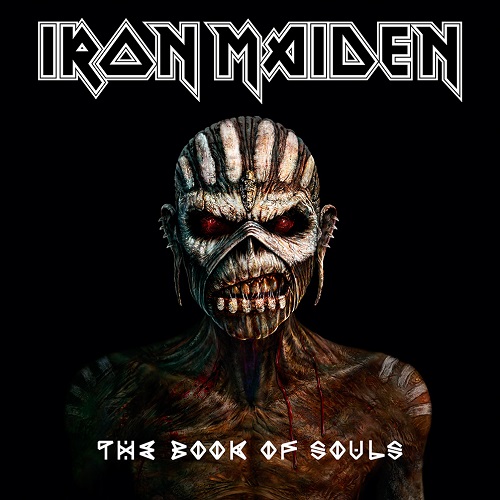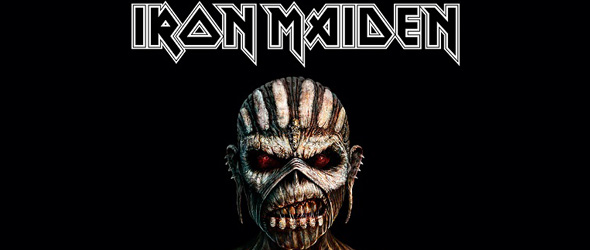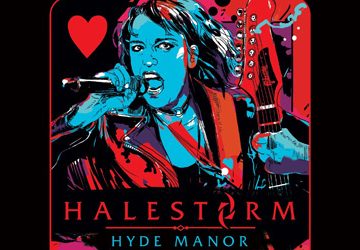
In the tangled, cyclical, world of Hard Rock and Heavy Metal, fans and critics alike would be hard-pressed to think of another musical entity as vital and magical as Iron Maiden. They personified a movement known as the New Wave of British Heavy Metal, exploding out of the 1970s to mix street appeal with the rollicking melodies and twin guitar harmonies of bands like Thin Lizzy and Angel Witch. When they settled upon a chap by the name of Bruce Dickinson, what followed was an era of mastery eclipsed by almost no other act on the planet. After the wheels went off the bus in the 1990s, the circular pattern of life and music brought the boys back together, giving the new millennium a proper Iron Maiden line-up once again. This of course brought the good ship Maiden up against the one barrier all vintage bands face. Can the new material stand up to the “classic” era? Even the most cynical of observers will be hard-pressed to find much support in the “no it can’t” argument.
Opinions vary, but 2000’s Brave New World and 2006’s A Matter of Life And Death were great records, while 2003’s Dance of Death and 2010’s The Final Frontier were solid overall, each featuring some great moments among some mediocre ones. When it surfaced that Iron Maiden would be releasing their sixteenth studio album, the news was greeted with virtually no trepidation, for the legions of fans of this honest, down-to-earth collective know better. Iron Maiden has nothing to prove at this point in their career, and with age and health having its inexorable way, fans can rest assured that a new album means the band really has something to say and is not just going through the motions.
The Book Of Souls was officially released on the 4th of September, 2015, marking the longest period between releases in the band’s storied history. Cancer will do that, though, and it was not until singer Bruce Dickinson defeated the tumor in his throat that the album would see the light of day. Recorded from September through December 2014 with their old friend Kevin Shirley at the production helm, The Book Of Souls was laid down virtually as it was written, its creators at one with their creation, confident enough to develop and finish the songs right then and there. The choice of Guillaume Tell studios was a significant one too, as it was the same studio in which they recorded Brave New World, back at the dawn of their reformation with Dickinson and Adrian Smith (guitars) in 1999.
Of particular note is the new album’s length. Ninety-two minutes is a long time, especially in today’s era of soundbites and rapid-fire click-bait mentality. Iron Maiden does not care about trends though; they never have and, forty years on from their formation, it is safe to say they never will. Based loosely around the concept of mortality and the soul, The Book of Souls artist, Mark Wilkinson, developed a Mayan theme for the album’s more sinister cover art. The band even used an older version of their timeless logo, last seen on 1995’s The X Factor album.
Despite all the hype surrounding such a momentous album release as this, even amid all the confidence and goodwill toward these salty East Enders, it is the music that will always be foremost. Iron Maiden has never rested on their laurels, boasting on many an occasion that they are not a nostalgia act. As many beautiful gems as they have given fans over the decades, there have also been some hiccoughs. Though Steve Harris is the only truly original member left, no one in the band today has been a part of the Maiden machine for less than Janick Gers’ (still prolific) twenty-six years. Long in the tooth or not, Iron Maiden has never wanted vitality, and “If Eternity Should Fail” begins with an echoing vocal solo from Dickinson. The song was originally written with the idea of a solo record in mind, and its inclusion as the opening song might just mean that the Air-Raid Siren is as dialed into Maiden as he was in those glorious 1980s. Full of hooks, powerful vocal lines, and the melody Maiden fans have come to love, it is a very strong opener that should have fists pumping in the air at arenas the world over next year. The payoff comes much quicker than on “Satellite 15 . . . The Final Frontier” (2010 The Final Frontier), but it is not a four-minute paint-by-numbers tune either. Not to say songs like “Wildest Dreams” and “Different World” are not okay, but Maiden fans tend to hunger for the epic from this band, and when this one dials down with a creepy double voice-over narrative, the feeling is prevalent that the hour and a half this album demands from the listener will be met with excitement.
First single “The Speed Of Light” opens with some cowbell and Bruce’s more late ’80s gravelly scream. A more traditional Rock structure resolves itself into the classic Iron Maiden intangible quality on the chorus. Dickinson’s voice is in amazing form. Each note he bellows is a middle finger in the face of our common enemy, cancer. He sounds strong and unstoppable on this song, like a man who fronts the world’s biggest Heavy Metal band while flying jumbo jets and writing books.
“The Great Unknown” builds on a reliable Steve Harris bass line. The guitars – there are three of them, do not forget – blend together seamlessly. In this song, Dickinson is in full storytelling mode. A slow builder, the tune will place velvet hooks inside the listener’s brain. Nicko McBrain, who has manned the kit since 1983, sounds smooth and on point, and no one should be surprised by that. Dickinson challenges himself, attacking the mic at the top of his register with the energy of someone a third his age. On The Book of Souls, the solos and the riffs feel freer, somehow, most likely a testament to the spontaneity with which the material was composed. Fans will eat up the give-and-take guitar solos going on around 4:45 onward, as their playful, yet intense nature bridges the years between the classic era and now.
Three songs this strong to begin a Maiden album is something fans have not seen since the 1999 reintroduction of Bruce Dickinson, and arguably the strongest opening triumvirate since 1988’s Seventh Son of A Seventh Son. With this incredible feeling building, the next song up clocks in at 13:34. The astute fan will realize this is the exact length of “Rime of the Ancient Mariner” off of 1984’s Powerslave album. Though it lacks the variation of moods and sounds of this former epic, “The Red and The Black” is chock-full of rhythm and existential questions, lyrically exploring death and perhaps redemption. The song slides by, and the listener tends to forget they are challenging a song like “Rime” time-wise. Iron Maiden is a creative unit in sync, where the passages do not sound at all forced. A “whoa-oh-oh” singalong is a fitting treat and should translate amazingly well to the live setting.
“Where The River Runs Deep” is a speedster, with a very Judas Priest-like melody line going on. Catchy and carrying a bit of a bad attitude in its delivery, it follows nicely after the lengthy tune preceding it, and overall, it is one of the heaviest, straight-ahead rockers the band has produced since “Be Quick Or Be Dead” off 1992’s Fear of the Dark. When this one ramps down to its conclusion, the acoustic strumming of the title track comes in. At over ten minutes in length, it promises the Progressive leanings fans have come to salivate over. Will it deliver? The slow-paced, heavy verses are augmented by some crash-cymbal over the melodies. The title track possesses that introspective, contemplative tone that Maiden gave us with songs like “Infinite Dreams” (1988 Seventh Son of a Seventh Son). In the background, one can hear orchestral accompaniment clearly in the mix. Fans who embraced 1986’s Progressive Somewhere in Time will have no issue with this type of production, while fans of their simpler, more old-school material should still be pleased. The song has more than enough teeth to go with its dreamlike meandering. The guitar solos abounding at around the 8:30 mark sound as fresh and melodious as anyone could want, and when the song concludes with that same acoustic strumming, the feeling is without a doubt that part one of the double album is a success.
“Death Or Glory” starts the second half out strong, a rollicking tune about WWI tri-planes from the pilot’s perspective. While nothing will ever touch “Aces High” off 1984’s Powerslave, this one will have the listener humming that melody for days on end. Most will agree that, while not quite as good as the aforesaid “Aces High,” it is better than “Tailgunner” off 1989’s No Prayer For The Dying. The guitar tone during the chorus sounds mean and Metal as fuck, with Steve Harris clacking away on that Fender four-string as he has done for so long now.
The intro to “Shadows of the Valley” sounds so close to that of fan favorite “Wasted Years” off of 1986’s Somewhere In Time. Fans will not complain. The song itself is one of the stronger ones on the album, featuring some more of that “whoa-oh-oh” gang vocal sing-along goodness that is so damn catchy. Written as a tribute to the downfall and eventual demise of the beloved Robin Williams, “Tears of a Clown” could be more of a grower, but it’s hard to ignore the well-wrought lyrical message. “The Man of Sorrows” continues the melancholy theme, doubting our long-held beliefs in the face of impending mortality. A gorgeous song, it is equal parts sadness and triumph in its delivery. Fans will recall the mood of such favorites as “Children of the Damned” off of 1982’s The Number of the Beast and “Sea of Madness” off of 1986’s Somewhere In Time.
One of the bigger nuggets of gossip coming from the Maiden camp this Summer was the inclusion of an eighteen-minute epic on the album. Just what would the longest song they ever wrote do for the Iron Maiden canon? The answer in a word . . . captivate. “Empire of the Clouds” was written by Bruce Dickinson, with the frontman playing the piano quite adroitly, its classical accompaniment is as elegant and natural as if they had always done it this way. The passion and feeling here cannot be denied, as Dickinson waxes poetic about the 1930 R101 airship disaster over France. A story allowed to unravel by the engaging balladry going on within its generous running time, this song will take its place beside those most immortal of Maiden classics. Instrumentally, the song weaves into Progressive territory around seven or eight minutes in, as the repeated riff sits beautifully over some sensational Nicko McBrain drumming. The listener could glean any snippet of this part of the tune and be instantly transported to those most classic instrumental breaks in the Maiden annals. The final section, where the disaster of the ship becomes imminent, is ushered in with some portentous piano playing and a crashing accompaniment. In this way, the song takes the listener through varying moods, all of which Maiden weave seamlessly together.
The Book Of Souls, therefore, will go down as one of the better Maiden albums ever created. Only time will tell where it will end up sitting beside such monsters as 1982’s The Number of The Beast, 1983’s Piece of Mind, 1984’s Powerslave, or 1988’s Seventh Son of a Seventh Son. For some, these albums will never ever be pushed from their lofty perch. Wait ’til The Book Of Souls sinks into the consciousness of Maiden-dom. Will it unseat the classics or push them from their perch? No, of course not. But room will have to be made because this album will demand it. CrypticRock ups the irons with 5 out of 5 stars for The Book of Souls.






No comment